DEFENDANTS with `winnable cases' are pleading guilty to criminal charges because court delays due to Covid-19 would see them spending longer in jail on remand than the maximum sentence if convicted.
One solicitor told The Irish News that once those remanded in custody on charges such as common assault or disorderly behaviour have served four months "there is no practical reason for them not to plead guilty" as courts would only hand them a two or three month sentence.
Other lawyers report that clients are calculating it is not worth their while to contest the charges and pleading guilty "just to get it over with", warning people are racking up unnecessary convictions.
"Some clients can't manage to keep bail conditions and end up being remanded into custody, but there is no date for their hearing so they're choosing to plead guilty," a Belfast solicitor said.
"These are cases that they could win in court. We tell clients you should not plead guilty to something you haven't done, but they don't want to spend months in jail."
Courts have a significant backlog of cases caused by Covid-19 closures and restrictions to work through and are only now moving from dealing with urgent or agreed matters to listing a limited number of contested cases (where the defendant pleads `not guilty') in magistrates courts.
Business is primarily being done by Sightlink - Zoom-style hearings consolidated into `court hubs' at Belfast's Royal Courts of Justice, Laganside (which also deals with Ballymena, Antrim, Ards and Downpatrick), Lisburn (which also deals with Craigavon, Armagh, Newry and Banbridge), Dungannon (also dealing with Omagh, Enniskillen and Strabane) and Derry (also dealing with Magherafelt, Limavady and Coleraine).
The only magistrates court cases which have been heard so far are contested matters on the written papers - without witnesses.
Crown court trials have started on a very limited basis in Belfast and are expected to begin around the north "in the next couple of weeks".
Pearse MacDermott, chair of the Solicitors Criminal Bar Association, said members are reporting "four or five cases per firm" where clients are `pleading out' to cut their prison time and it believes "dozens" of such additional pleas have been entered since the courts were shut down by coronavirus.
"There are concerns that people are changing their pleas to guilty because they were not getting a trial date. It is affecting clients who already have a record and are more likely to be remanded into custody.
"But among them are people who are pleading guilty who are not guilty or where the prosecution can't prove the case.
"Even if the cases get listed all it will take is a witness to call on the day of the trial and say they have tested positive for Covid-19 and can't come to court and that will knock everything back again.
"It is very unsatisfactory position and (solicitors) get the feeling pragmatic decisions are being taken by clients.
"The Court Service is not to blame, it is not their fault. It was a bit slow to get a situation where they tried to look at alternative venues and ways of doing things, but with Covid we are where we are."








